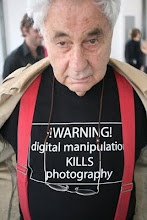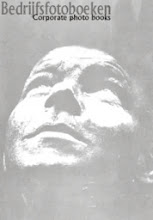IS ROBERT FRANK’S “THE AMERICANS” THE BEST PHOTOGRAPHY BOOK? by PACO ELVIRA
The Americans was published in France, by Delpire, in 1958 and in America in 1959, but before that, in 1952 in Paris and 1954 in New York, Henri Cartier-Bresson had already published his The Decisive Moment. Aside from the importance of the creation of the Magnum Photo Agency, Cartier-Bresson brought a new style of photography based on the new 35-mm rangefinder cameras, as Leica, and his theory of The Decisive Moment is still in force today. I agree that the principles of the French photographer could not remain immutable forever, but, don’t the images of Frank, that I show here, remember quitte a lot to the ones Henri Cartier-Bresson took a few years earlier?
ROBERT FRANK. CHICAGO 1955-1956

CARTIER-BRESSON. NEW YORK 1947

ROBERT FRANK. INDIANAPOLIS 1955-1956

CARTIER-BRESSON. LOS ANGELES 1946

ROBERT FRANK. LONDON1952

CARTIER-BRESSON. NEW YORK 1947
 NEW YORK 1954-1955. WILLIAM KLEIN
NEW YORK 1954-1955. WILLIAM KLEIN NEW YORK 1954-1955. WILLIAM KLEIN
NEW YORK 1954-1955. WILLIAM KLEIN  NEW YORK 1954-1955. WILLIAM KLEIN
NEW YORK 1954-1955. WILLIAM KLEIN SWEET LIFE. ED VAN DER ELSKEN 1959
SWEET LIFE. ED VAN DER ELSKEN 1959  SWEET LIFE. ED VAN DER ELSKEN 1959
SWEET LIFE. ED VAN DER ELSKEN 1959 JUKEBOX. ROBERT FRANK NEW YORK 1955-1956
JUKEBOX. ROBERT FRANK NEW YORK 1955-1956 TOMOKO EN EL BAÑO / TOMOKO IN THE BATH. EUGENE W. SMITH 1972
TOMOKO EN EL BAÑO / TOMOKO IN THE BATH. EUGENE W. SMITH 1972

















3 opmerkingen:
I think it is difficult to choose a best of something, and even more for a photo book. I unfortunately never had in my hands "sweet life" so can't say anything about it. But for me the biggest difference between "the decisive moment", "New York" and "The Americans" is that the later has a "political" approach and destabilize the viewer by the point of view and the ideas more than just the photography. So I do not think comparing power of photographs is a good way to do it as we are talking about a book so it's a group of pictures. (We have in the case of Eugene Smith to say, as great photographer he was, that his pictures are often set up ("Tomoko in the bath" was)and so not comparable to Frank's pictures)
Surely "New York" has a much greater graphical impact, and sure "the decisive moment" gave birth to a long lasting perception of photography and have a beautiful poetic vision, but "the Americans" shacked the American Way of life...
Which one of the 3 is best? I'll not take the responsibility to respond to that question.
I think it is difficult to choose a best of something, and even more for a photo book. I unfortunately never had in my hands "sweet life" so can't say anything about it. But for me the biggest difference between "the decisive moment", "New York" and "The Americans" is that the later has a "political" approach and destabilize the viewer by the point of view and the ideas more than just the photography. So I do not think comparing power of photographs is a good way to do it as we are talking about a book so it's a group of pictures. (We have in the case of Eugene Smith to say, as great photographer he was, that his pictures are often set up ("Tomoko in the bath" was)and so not comparable to Frank's pictures)
Surely "New York" has a much greater graphical impact, and sure "the decisive moment" gave birth to a long lasting perception of photography and have a beautiful poetic vision, but "the Americans" shacked the American Way of life...
Which one of the 3 is best? I'll not take the responsibility to respond to that question.
Congratulations on a well reasoned argument. If I had to choose between Frank and Klein, I'd go for Frank every time. Frank is an observer and recorder while Klein is a participant and provocateur. Klein photographs dramas of his own making, his own interventions are critical. Frank employs intense powers of observation to record what others would never see. What would Walker Evans have said? Evans assisted Frank with his Guggenheim application - I don't think he'd have been impressed by Klein's bombast and rhetoric.
Een reactie posten